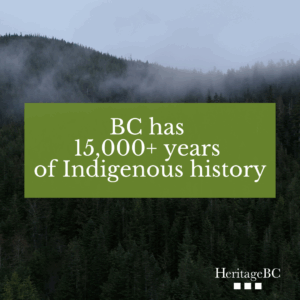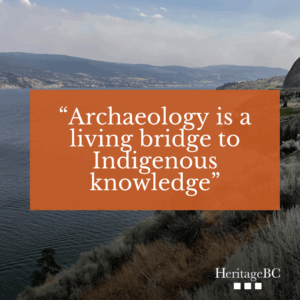 Did you know that some archaeological sites in British Columbia date back as far as 15,000 years Before Present (BP)? This is truly ancient, especially when compared to the Europeans arrival less than 200 years ago.
Did you know that some archaeological sites in British Columbia date back as far as 15,000 years Before Present (BP)? This is truly ancient, especially when compared to the Europeans arrival less than 200 years ago.
Have you ever wondered how materials like jade and obsidian, found on Vancouver Island, travelled from up to 1,300 km away from Oregon and Idaho? How did it get there and what does it tell us about ancient networks and trade in BC?
And did you know that many archaeological sites in BC are as old as or older than the Egyptian pyramids?
These kinds of archaeological sites and artefacts are examples of what we refer to as Ancient Heritage. Alongside histories, landscapes and lifeways that predate European colonization by millennia, archaeology and Ancient Heritage should be considered central to British Columbia’s heritage.
At Heritage BC, we recognize that the story of this province goes far beyond settler history, and that the Ancient Heritage must be acknowledged, included and celebrated. Unfortunately, archaeology is often overlooked, or even downplayed, in broader conversations about heritage. Instead, it is seen as static or purely academic, rather than a vital part of understanding living histories, ongoing Indigenous presence, and the deep human connection to this land. This limited view of archaeology could stem from unconsciousness to “cultural blinders,” or, in some cases, deliberate attempts to erase the First People’s long history and undermine their rightful claims to their land.
One of the main ways archaeology is currently considered within heritage conversations is through the lens of planning and development. Rapid population growth and expanding development have had a devastating impact on the ancient archaeological resources across this province.
British Columbia holds archaeological evidence of over 15,000 years of human occupation, aligning with First Nations oral histories that speak of time immemorial. This means that nearly every town, city, and industrial site in BC has been built on or near ancient archaeological landscapes, often without proper recognition, consultation, or protection. As a result, countless sites have been damaged or destroyed, taking with them irreplaceable connections to Indigenous histories and knowledge systems. In many instances, First Nations communities are consulted in planning processes only after sites have been damaged, making it nearly impossible to learn from and honour what Indigenous ancestors left for us.
From a legal and administrative perspective, planners, developers and anyone building on land with archaeological interests share the responsibility to conduct necessary investigations and to work with the Archaeology Branch and First Nations communities to identify, respect, and protect archaeological sites before any ground is disturbed.
 Archaeology provides an incredible opportunity to learn, to acknowledge, and to celebrate. It is not just a box to check or a ‘barrier to progress’. Ancient Heritage is a remarkable window into human history, offering insights into the deep knowledge systems, technologies, and lifeways of the First Peoples of this land. Celebrating Ancient Heritage means moving beyond compliance toward curiosity and care. It means creating space for Indigenous voices to lead conversations about stewardship, interpretation, and storytelling. It means recognizing that ancient sites are not just part of the past—they are part of a living, ongoing relationship between people and place.
Archaeology provides an incredible opportunity to learn, to acknowledge, and to celebrate. It is not just a box to check or a ‘barrier to progress’. Ancient Heritage is a remarkable window into human history, offering insights into the deep knowledge systems, technologies, and lifeways of the First Peoples of this land. Celebrating Ancient Heritage means moving beyond compliance toward curiosity and care. It means creating space for Indigenous voices to lead conversations about stewardship, interpretation, and storytelling. It means recognizing that ancient sites are not just part of the past—they are part of a living, ongoing relationship between people and place.
At Heritage BC, we have a responsibility to raise awareness of the issues and difficulties in preserving and promoting the ancient history of this land, for the benefit of all. We believe that archaeology (and Ancient Heritage) in BC is a living bridge to Indigenous knowledge, a source of community identity, and a reminder of both resilience and responsibility. We want to raise awareness that the loss of archaeology is the loss of the province’s rich heritage.To support this, we are reviewing our current programs and communications to bring this important topic more front and centre. We look forward to sharing our progress through upcoming communications, program offerings, blog posts and newsletters.
This guest blog post was written by Dianne Hinkley, an Indigenous anthropologist and Chair of Heritage BC’s Ancient Heritage Committee. Formed in 2023, this Committee has been learning together about Ancient Heritage and exploring ways to support its integration into Heritage BC’s existing programs. Current Committee members include Dianne Hinkley, Kristina Hannis, archaeologist Christina Reid and Britney Dack.
